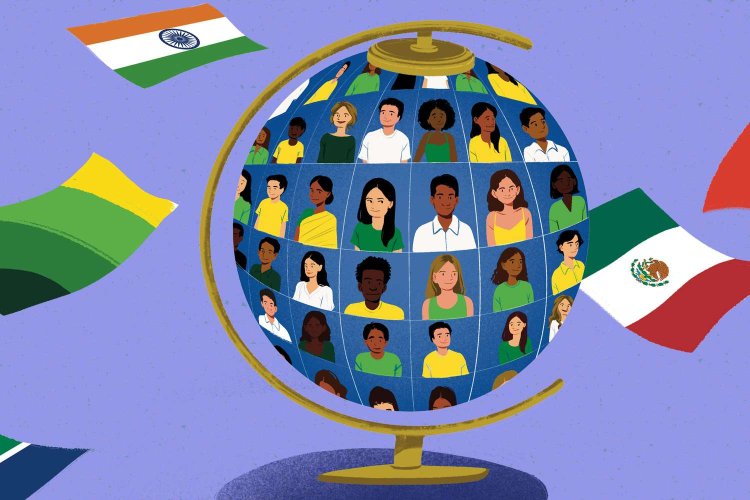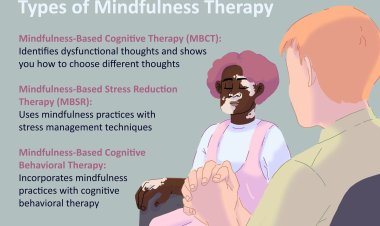How Do Other Countries Deal With Mental Health?
While stigma remains one of the biggest barriers to seeking mental health for the BIPOC community, the conversation doesn’t end there.

Despite the fact that the BIPOC community still faces significant challenges when it comes to discussing mental health, the discussion must continue. This feature, timed to coincide with Minority Mental Health Month, will shine a focus on health literacy, alternative healing practises, epigenetics, and generational trauma as they relate to the BIPOC community's access to mental health treatment.
Maintaining a healthy mind is crucial to living a full life. The stigma associated with mental illness, however, varies greatly from one nation to the next. There may be some universal truths about mental health, but each country's perspective will be shaped by its own customs, beliefs, and difficulties. In addition, they will employ methods of dealing with problems that are unique to their culture. In this post, we'll take a look at how different nations approach mental health services.
General Country-Specific Mental Health Cultural Practices
Disorders of mental health have been identified as the second greatest cause of illness burden worldwide, as measured by "years lived with disability."1 Also, low- and middle-income countries have a disproportionately large treatment gap for people with mental illness.
As was previously said, the approach to mental health care might vary among cultures. "Some of these practises may be beneficial, while others may be harmful or ineffective," says Dr. Ketan Parmar, an Indian forensic psychiatrist. Dr. Parmar provides the following illustrations to provide context:

The concept of "face," which refers to one's reputation, dignity, or honour, is prevalent in several Asian cultures. This is especially true in China, Japan, and Korea. Due to concerns about social stigma, some people with mental health issues may postpone getting care or coming clean about their illness.
India
It is estimated that barely one in every twenty people in India actually receives therapy.2 Multiple issues, including discrimination, a lack of educated experts, low help-seeking, and inadequate availability (and hence accessibility) to these services across the country, have been identified as contributors to this treatment gap.3
In order to meet the demands of its people in the area of mental health, India was ahead of the curve when it came to developing a National Mental Health Programme (NMHP).4 The National Mental Health Programme (NMHP) was established in 1982 to address the pressing need for mental health care facilities; in 2003, it was re-strategicized to incorporate the "upgrading" of psychiatric units at medical schools and general hospitals as well as the modernisation of state mental hospitals. Though its effectiveness has been questioned, much progress has been made since then.

In Indian culture, the importance of family in shaping one's outlook on mental health, access to treatment options, and willingness to ask for help cannot be overstated. Smriti Joshi, M.Phil, a lead psychologist at Wysa, says, "In most cases, individuals may initially turn to their families for support and guidance, and the support received is precious, sometimes this can provide a safe space for the individual and allow them to vent and try different strategies to cope with their stressors or concerns."
China
According to studies, many Chinese people still have a stigmatised view of seeking mental health therapy. There is widespread ignorance about the origins, cures, and avoidance of mental disease. More work is needed to promote awareness and receptivity to mental health care, and this varies by age, education level, social support, and income. To lessen public stigma and encourage more individuals to seek and receive mental health services and support, it is crucial to enhance access to mental health education, professional training, and service utilisation.56
Specialist mental health services became the primary means of accessing mental health care in China when the country's former community-based mental health system was dismantled.7 So, instead of going via the primary and secondary health care systems, people with mental health issues can go straight to psychiatric hospitals or the mental health wing of regular hospitals. However, China's mental health care system has seen significant evolution in recent years.
Japan
Treatment for mental health issues is generally accessible in Japan, and is typically covered by the national health insurance programme.11 Therefore, people are only responsible for paying 30% of the overall cost, and they can go to whatever healthcare provider they like. However, as compared to other nations, Japan is much behind in terms of deinstitutionalization and has a larger number of beds dedicated to psychiatric care.12 Although the average length of time in mental care beds has decreased from around 500 days in 1990 to around 266 days in 2018, there is still room for improvement.13 Both the number of people admitted to psychiatric hospitals and the average length of their hospitalisations are under criticism and pressure to be reduced.
Further studies have shown that the social and cultural stigma associated with mental health in Japanese society is a significant barrier to receiving treatment. One study indicated that 63.9% of people who did not seek therapy for mental health issues did so because they did not believe they needed treatment.11 As a result, 68.8% of people said they delayed care because they preferred to try to fix the issue themselves first. As a result of not feeling like they needed help, 54.2% stopped receiving treatment.
South Africa
The epidemic made preexisting structural inequalities, such as lack of access to adequate healthcare, poverty, and unemployment, more worse in South Africa.14 While the South African government attempted to address the health system's historic difficulties at the end of Apartheid through legislative change, the implementation of such legislation did not close the gap.
Thus, studies showed that only about 5% of South Africa's overall public health budget went towards mental health, in part because of the lack of a sustainable funding strategy.15 It was also observed that inpatient care accounted for 86% of the total cost.
According to statistics published by the South African College of Applied Psychology, only 27% of people in South Africa who report having a severe mental illness actually obtain treatment.16 This is cause for alarm because South Africa's history has been marked by a number of intergenerational and social traumas, including Apartheid, the AIDS pandemic, and gender-based violence (GBV), all of which could exacerbate the symptoms of mental health problems like depression, anxiety, and phobias if they were to be combined with the effects of the epidemic.
Colombia
Understanding and appreciating the history of widespread exposure to violence in the country is crucial, just as it was in South Africa. This is because it is crucial to put current issues in the perspective of the country's 60 years of armed war, high homicide rates, gang activity, gender-based violence, and intra-family violence.19
Therefore, many people in the population have experienced trauma. The abuse of alcoholic beverages and illegal drugs also puts a strain on these facilities. Poor mental health and lack of access to help are exacerbated by the fact that over 15% of Colombia's population has been displaced by the conflict and, as a result, has unique needs that are difficult to address in the communities in which they currently reside.20
Spain
People in Spain may get the medical treatment they need because to the country's publicly funded system, which is supported by federal, regional, and local taxes.25 Seventy-one percent comes from the government, while the remaining 29 percent comes from "voluntary" private contributions.26
In the United States, people with mental health issues are treated using a community-based approach. The goal is to provide all-encompassing care that prioritises prevention and is guided by the values of individual agency, openness, continuity, and fairness.27 As a result, primary care teams and community healthcare providers collaborate in an interdisciplinary fashion to deliver the best care possible. Recent years have seen more developments in this approach, including enhancements to the population-based aspects, person-centered care, user experience, and assessment models.28
Rodrguez-Eguizábal E, Gil-de-Gómez MJ, Coronado-Vázquez V, et al. Patients with mental illness in Spain rate the responsiveness of primary care providers. DOI:10.1186/s12913-022-07516-2 BMC Health Services Research. 2022;22(1):133.
Thus, in terms of confidentiality, communication, and respect, patients with mental illnesses often report that their primary care is attentive to their needs.
Costa Rica
Both the quality of healthcare and the level of happiness in Costa Rica consistently receive good marks. Aside from that, the unofficial slogan of the country is "pura vida," which means "pure life," and it sums up the general attitude and way of life of the people there. As a result, compassion for others and a concern for a high standard of living predominate in this culture.31
Payroll taxes support the national healthcare system, known as the Caja Costarricense de Seguro Social (CCSS). This means that almost everyone in Costa Rica has free access to quality medical care. As a result, Costa Rica's educational system is consistently lauded as among the best in Latin America, with some naming it among the top three.
Mexico
There is a large treatment gap since mental healthcare is difficult to access in Mexico. Several factors contribute to this, but ultimately, mental health services are provided by a fragmented system of institutional providers that lacks adequate resources, funding, and coordination and is therefore cut off from the larger health care system.32
R. Kohn; A. A. Ali; V. Puac-Polanco; and others. The prevalence of mental illness and the availability of care in the Americas. Doi:10.26633/RPSP.2018.165 Rev Panam Salud Publica. 2018;42:e165.
Therefore, only 77.9% of people with moderate mental disorders (such as bipolar disorder or schizophrenia) and 76.2% of those with severe mental disorders (also such as depression or mania) obtain therapy.
While there is a dearth of appropriately qualified mental health specialists in these settings, patients also face challenges getting to the nearest health centre due to a lack of financial resources and access to public transit.
Other Ways People From These Countries Seek Mental Health Care
The Use of Online Platforms
Apps, websites, and social media have all seen increased use in the realm of mental health management. Therefore, relying on digital resources is now considered an unconventional tactic in and of itself. Dr. Parmar argues that the widespread use of such sites is due to the fact that they help people feel less isolated by connecting them with people who share their experiences. When it comes to mental health, "these platforms may also offer people access to information, resources, or tools to manage their problems or to seek help from professionals or peers," he says.
Seeking Mental Health Care From Practitioners Located Abroad
Avigail Lev, PsyD, founder & director at Bay Area CBT Centre, has received clients from all over the world, including India, Mexico, and Spain, despite the fact that she is based in the United States.
As a result, she has first-hand knowledge of the challenges people in these regions encounter while seeking out mental health care. Her research shows that "clients reaching out from abroad seem to struggle to find a therapist who specialises in evidence-based treatments and cognitive behavioural therapy (CBT)." This is perhaps because specialised modalities like CBT are scarce and therefore difficult to gain access to.













